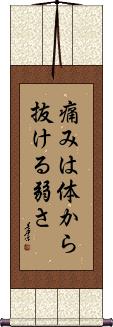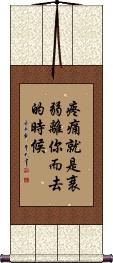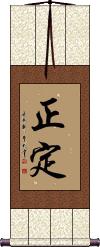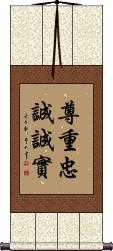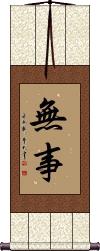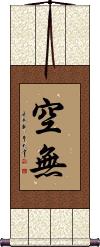Many custom options...
And formats...

Leaving in Chinese / Japanese...
Buy a Leaving calligraphy wall scroll here!
Personalize your custom “Leaving” project by clicking the button next to your favorite “Leaving” title below...
1. Pain is Weakness Leaving the Body
2. Outstanding
3. 8. Right Concentration / Perfect Concentration
5. No Trouble / Freedom from Problems
6. Nothingness
Pain is Weakness Leaving the Body
痛みは体から抜ける弱さ is how to write “pain is weakness leaving the body” in Japanese.
I remember this being shouted a lot during U.S. Marine Corps boot camp.
Note: Because this selection contains some special Japanese Hiragana characters, it should be written by a Japanese calligrapher.
Pain is Weakness Leaving the Body
I remember this being shouted a lot during U.S. Marine Corps boot camp. 疼痛就是衰弱離你而去的時候 is how to write that phrase in Chinese. At least, this is as close as we could compose/translate it, and hold the full original meaning and connotations.
The version shown here is really, “Pain is weakness leaving your body.” Although it's said in English both ways (the or your), it works better in Chinese with “your.”
Outstanding
8. Right Concentration / Perfect Concentration
Samyak Samadhi / Samma Samadhi
正定 is one of the Noble Eightfold Paths of Buddhism. Right Concentration, along with Right Effort and Right Mindfulness, constitute the path to Concentration or Perfect Thought.
Right Concentration has to do with leaving behind sensuality, unwholesome states, as well as pleasure and pain. 正定 is a complex idea, but once you have achieved the shedding of worldly sensation, you can truly concentrate and find a higher level of awareness.
Another definition: Concentration of mind that finds its high point in the four absorptions.
This term is exclusively used by devout Buddhists. It is not a common term, and is remains an unknown concept to most Japanese and Chinese people.
See Also: Buddhism | Enlightenment | Noble Eightfold Path
Pillars of Marriage
Respect / Loyalty / Honesty
尊重忠誠誠實 is a “word list” consisting of “Respect/Loyalty/Honesty.”
Word lists are not as common in Chinese as they are in English but leaving that concern behind, this has a good meaning.
If you want to customize it more, add an inscription with your wedding date or names (just a small extra fee for translation).
Note: Because these are three separate words, the calligrapher may be inclined to leave a small space between each two-character word. Let us know if you have any preference when you place your order.
No Trouble / Freedom from Problems
無事 is a Zen Buddhist term meaning no problem and no trouble.
無事 is the Zen state of perfect freedom from troubles and leaving secular affairs behind.
Sometimes this is used to describe the state of satori and complete tranquility of mind.
Written as 無事に with an extra Hiragana at the end, this becomes an adverb to describe something in the condition of safety, peace, quietness, and without troubles.
無事 (Buji) can also be a given name in Japan.
This has more meaning in the Japanese Zen Buddhist community than in China or Korea, where it can mean “be free” or “nothing to do or worry about.”
Nothingness
空無 is “nothingness” in a Buddhist context.
The first character means empty but can also mean air or sky (air and sky have no form).
The second character means have not, no, none, not, or to lack.
Together these characters reinforce each other into a word that means “absolute nothingness.”
I know this is a term used in Buddhism, but I have not yet figured out the context in which it is used. I suppose it can be the fact that Buddhists believe that the world is a non-real illusion, or perhaps it's about visualizing yourself as “nothing” and therefore leaving behind your desire and worldliness.
Buddhist concepts and titles often have this element of ambiguity or, rather, “mystery.” Therefore, such ideas can have different meanings to different people, and that's okay. If you don't get it right in this lifetime, there will be plenty more lifetimes to master it (whatever “it” is, and if “it” really exists at all).
Soothill defines this as “Unreality, or immateriality, of things, which is defined as nothing existing of independent or self-contained nature.”
These search terms might be related to Leaving:
Goodbye
If You Love Your Child, Send Them Out Into the World
Never Put Off Until Tomorrow What You Can Do Today
Not the results for leaving that you were looking for?
Below are some entries from our dictionary that may match your leaving search...
| Characters If shown, 2nd row is Simp. Chinese |
Pronunciation Romanization |
Simple Dictionary Definition |
四諦 四谛 see styles |
sì dì si4 di4 ssu ti shitai したい |
More info & calligraphy: Four Noble Truths (Buddhism){Buddh} (See 苦集滅道) The Four Noble Truths catvāri-ārya-satyāni; 四聖諦; 四眞諦. The four dogmas, or noble truths, the primary and fundamental doctrines of Śākyamuni, said to approximate to the form of medical diagnosis. They are pain or 'suffering, its cause, its ending, the way thereto; that existence is suffering, that human passion (taṇhā, 欲 desire) is the cause of continued suffering, that by the destruction of human passion existence may be brought to an end; that by a life of holiness the destruction of human passion may be attained'. Childers. The four are 苦, 聚 (or 集), 滅, and 道諦, i. e. duḥkha 豆佉, samudaya 三牟提耶, nirodha 尼棲陀, and mārga 末加. Eitel interprets them (1) 'that 'misery' is a necessary attribute of sentient existence'; (2) that 'the 'accumulation' of misery is caused by the passions'; (3) that 'the 'extinction' of passion is possible; (4) mārga is 'the doctrine of the 'path' that leads to the extinction of passion'. (1) 苦 suffering is the lot of the 六趣 six states of existence; (2) 集 is the aggregation (or exacerbation) of suffering by reason of the passions; (3) 滅 is nirvana, the extinction of desire and its consequences, and the leaving of the sufferings of mortality as void and extinct; (4) 道 is the way of such extinction, i. e. the 八正道 eightfold correct way. The first two are considered to be related to this life, the last two to 出世間 a life outside or apart from the world. The four are described as the fundamental doctrines first preached to his five former ascetic companions. Those who accepted these truths were in the stage of śrāvaka. There is much dispute as to the meaning of 滅 'extinction' as to whether it means extinction of suffering, of passion, or of existence. The Nirvana Sutra 18 says that whoever accepts the four dogmas will put an end to births and deaths 若能見四諦則得斷生死 which does not of necessity mean the termination of existence but that of continued transmigration. v. 滅. |
釋迦牟尼 释迦牟尼 see styles |
shì jiā móu ní shi4 jia1 mou2 ni2 shih chia mou ni Shakamuni |
More info & calligraphy: Shakyamuni / The Buddha釋迦文 (釋迦文尼); 釋伽文 Śākyamuni, the saint of the Śākya tribe. muni is saint, holy man, sage, ascetic monk; it is: intp. as 仁 benevolent, charitable, kind, also as 寂默 one who dwells in seclusion. After '500 or 550' previous incarnations, Śākyamuni finally attained to the state of Bodhisattva, was born in the Tuṣita heaven, and descended as a white elephant, through her right side, into the womb of the immaculate Māyā, the purest woman on earth; this was on the 8th day of the 4th month; next year on the 8th day of the 2nd month he was born from her right side painlessly as she stood under a tree in the Lumbinī garden. For the subsequent miraculous events v. Eitel. also the 神通遊戲經 (Lalitavistara), the 釋迦如來成道記, etc. Simpler statements say that he was born the son of Śuddhodana, of the kṣatriya caste, ruler of Kapilavastu, and Māyā his wife; that Māyā died seven days later, leaving him to be brought up by her sister Prājapati; that in due course he was married to Yaśodharā who bore him a son, Rāhula; that in search of truth he left home, became an ascetic, severely disciplined himself, and finally at 35 years of age, under a tree, realized that the way of release from the chain of rebirth and death lay not in asceticism but in moral purity; this he explained first in his four dogmas, v. 四諦 and eightfold noble way 八正道, later amplified and developed in many sermons. He founded his community on the basis of poverty, chastity, and insight or meditation, ad it became known as Buddhism, as he became known as Buddha, the enlightened. His death was probably in or near 487 B.C., a few years before that of Confucius in 479. The sacerdotal name of his family is Gautama, said to be the original name of the whole clan, Śākya being that of his branch, v. 瞿, 喬.; his personal name was Siddhārtha, or Sarvārthasiddha, v. 悉. |
捐 see styles |
juān juan1 chüan en |
to relinquish; to abandon; to contribute; to donate; (bound form) tax; levy leaving |
暇 see styles |
xiá xia2 hsia ka ひま |
leisure (noun or adjectival noun) (1) spare time; free time; leisure; (2) time (e.g. time it takes to do something); (noun or adjectival noun) (3) time off; day off; vacation; holiday; leave; (4) quitting (one's job); firing someone; divorcing (one's spouse); (adjectival noun) (5) (of one's time) free; (of one's business) slow; (noun or adjectival noun) (1) spare time; free time; leisure; (noun or adjectival noun) (2) time off; day off; vacation; holiday; leave; (3) quitting (one's job); firing someone; divorcing (one's spouse); (4) leaving; departing a leisure moment |
発 see styles |
fā fa1 fa hatsu はつ |
Japanese variant of 發|发 (suffix noun) (1) (See 着・1) departure; departing from ...; leaving at (e.g. 8:30); (suffix noun) (2) sent from ...; (a letter, etc.) dated ...; datelined ...; (counter) (3) counter for engines (on an aircraft); (counter) (4) counter for gunshots, bursts of gas, etc.; counter for bullets, bombs, etc.; counter for blows (punches); counter for jokes, puns, etc.; counter for ideas, thoughts or guesses; (counter) (5) (vulgar) counter for ejaculations or sexual intercourse; (given name) Hiraku |
遑 see styles |
huáng huang2 huang itoma いとま |
leisure (noun or adjectival noun) (1) spare time; free time; leisure; (noun or adjectival noun) (2) time off; day off; vacation; holiday; leave; (3) quitting (one's job); firing someone; divorcing (one's spouse); (4) leaving; departing; (female given name) Itoma |
お暇 see styles |
oitoma おいとま |
(noun/participle) (1) (kana only) leaving; going home; (2) quitting one's job; (3) free time; leisure; spare time |
っぱ see styles |
ppa っぱ |
(suffix) (1) (colloquialism) (abbreviation) (after the -masu stem of a verb; indicates that something is left in an improper state) (See っぱなし・1) leaving (on, open, unfinished, etc.); (suffix) (2) (colloquialism) (abbreviation) (after the -masu stem of a verb) (See っぱなし・2) (doing) continuously; constantly; keep ...-ing |
一任 see styles |
ichinin いちにん |
(noun, transitive verb) entrusting (everything to); leaving (a matter) entirely with |
一空 see styles |
yī kōng yi1 kong1 i k`ung i kung ikkuu / ikku いっくう |
leaving none left; (sold etc) out (given name) Ikkuu All is empty, or of the void, non-material. |
七衆 七众 see styles |
qī zhòng qi1 zhong4 ch`i chung chi chung shichishu しちしゅ |
seven orders of Buddhist disciples (monks, nuns, probationary nuns, male novices, female novices, male lay devotees, female lay devotees) The seven classes of disciples:―(1)比丘 bhikṣu,monk;(2) bhikṣuṇī a female observer of all commandments; (3) 式叉摩那śikṣamāṇa, a novice, or observer of the six commandments; (4) 沙彌 śrāmaṇera, and (5) 沙彌尼 śrāmaṇerika, male and female observers of the minor commandments; (6) 優婆塞 upāsaka, male observers of the five commandments; and (7) 優婆夷upāsikā, female ditto. The first five have left home, the last two remain at home. Tiantai makes nine groups by dividing the last two into four, two remaining at home, two leaving home and keeping the eight commandments. Others make four groups, i.e. (1), (2), (6), and (7) of the above. Tiantai also has a four-group. |
下国 see styles |
gekoku げこく |
(1) province of the lowest rank (ritsuryō system); (noun/participle) (2) (archaism) leaving for the provinces; (surname) Shimokuni |
下校 see styles |
gekou / geko げこう |
(n,vs,vi) leaving school (at the end of the day); getting out of school; coming home from school |
下殿 see styles |
geden げでん |
leaving the palace; (surname) Shimodono |
不出 see styles |
bù chū bu4 chu1 pu ch`u pu chu fushutsu ふしゅつ |
(noun - becomes adjective with の) safekeeping; not going outside; not letting outside not leaving |
中乘 see styles |
zhōng shèng zhong1 sheng4 chung sheng chūjō |
The middle vehicle to nirvana, includes all intermediate or medial systems between Hīnayāna and Mahāyāna. It also corresponds with the state of a pratyekabuddha, who lives chiefly for his own salvation but partly for others, like a man sitting in the middle of a vehicle, leaving scarcely room for others. It is a definition made by Mahayanists unknown to Hīnayāna. |
中座 see styles |
nakaza なかざ |
(noun/participle) leaving one's seat; temporarily excusing oneself (from a meeting, meal, etc.); stepping outside; leaving before an affair is over; (place-name, surname) Nakaza |
中退 see styles |
chuutai / chutai ちゅうたい |
(n,vs,vi) leaving school during a term |
任せ see styles |
makase まかせ |
(suffix noun) leaving everything up to someone else |
休耕 see styles |
xiū gēng xiu1 geng1 hsiu keng kyuukou / kyuko きゅうこう |
to leave farmland to lie fallow (n,vs,vi) {agric} lying fallow; leaving a field uncultivated |
信託 信托 see styles |
xìn tuō xin4 tuo1 hsin t`o hsin to shintaku しんたく |
to entrust; trust bond (finance) (noun, transitive verb) trust; entrusting; leaving in someone's trust |
出京 see styles |
shukkyou / shukkyo しゅっきょう |
(n,vs,vi) (1) (See 上京) leaving for the capital; going to the capital; (n,vs,vi) (2) (See 離京) leaving the capital; (personal name) Suikyō |
出勤 see styles |
chū qín chu1 qin2 ch`u ch`in chu chin shukkin しゅっきん |
to go to work; to be present (at work, school etc); to be away on business (n,vs,vi) (See 退勤) going to work; leaving for work; attendance (at work); being at work; presence (in the office); reporting for work |
出向 see styles |
shukkou / shukko しゅっこう |
(n,vs,vi) (1) temporary transfer (of an employee); secondment; relocation; loan; (n,vs,vi) (2) proceeding to; leaving for; (surname) Demukai |
出国 see styles |
shukkoku(p); shutsugoku(ik) しゅっこく(P); しゅつごく(ik) |
(n,vs,vi) (ant: 入国) departure from a country; leaving a country |
出域 see styles |
shutsuiki しゅついき |
(noun/participle) leaving (a district, zone, etc.); going out of |
出定 see styles |
chū dìng chu1 ding4 ch`u ting chu ting shutsujou / shutsujo しゅつじょう |
(n,vs,vi) {Buddh} (ant: 入定・1) leaving a state of intense concentration To come out of the state of dhyāna; to enter into it is 入定. |
出庫 see styles |
shukko しゅっこ |
(noun/participle) (1) (See 入庫・1) delivery from a storehouse; shipping; (noun/participle) (2) (See 入庫・2) leaving a garage; leaving the depot |
出慧 see styles |
chū huì chu1 hui4 ch`u hui chu hui shutsue |
The wisdom of leaving mortality, or reincarnations; the wisdom of leaving the world. |
出校 see styles |
shukkou / shukko しゅっこう |
(noun/participle) going to or leaving school |
Click here for more leaving results from our dictionary
The following table may be helpful for those studying Chinese or Japanese...
| Title | Characters | Romaji (Romanized Japanese) | Various forms of Romanized Chinese | |
| Pain is Weakness Leaving the Body | 痛みは體から抜ける弱さ 痛みは体から抜ける弱さ | itami wa karada kara nukeru yowasa | ||
| Pain is Weakness Leaving the Body | 疼痛就是衰弱離你而去的時候 疼痛就是衰弱离你而去的时候 | téng tòng jiù shì shuāi ruò lí nǐ ér qù de shí hòu teng2 tong4 jiu4 shi4 shuai1 ruo4 li2 ni3 er2 qu4 de shi2 hou4 teng tong jiu shi shuai ruo li ni er qu de shi hou | t`eng t`ung chiu shih shuai jo li ni erh ch`ü te shih hou teng tung chiu shih shuai jo li ni erh chü te shih hou |
|
| Outstanding | 出類拔萃 出类拔萃 | chū lèi bá cuì chu1 lei4 ba2 cui4 chu lei ba cui chuleibacui | ch`u lei pa ts`ui chuleipatsui chu lei pa tsui |
|
| 8. Right Concentration Perfect Concentration | 正定 | sei jou / seijou / sei jo | zhèng dìng zheng4 ding4 zheng ding zhengding | cheng ting chengting |
| Pillars of Marriage | 尊重忠誠誠實 尊重忠诚诚实 | zūn zhòng zhōng chéng chéng shí zun1 zhong4 zhong1 cheng2 cheng2 shi2 zun zhong zhong cheng cheng shi | tsun chung chung ch`eng ch`eng shih tsun chung chung cheng cheng shih |
|
| No Trouble Freedom from Problems | 無事 无事 | buji | wú shì / wu2 shi4 / wu shi / wushi | wu shih / wushih |
| Nothingness | 空無 空无 | kuu mu / kuumu / ku mu | kōng wú / kong1 wu2 / kong wu / kongwu | k`ung wu / kungwu / kung wu |
| In some entries above you will see that characters have different versions above and below a line. In these cases, the characters above the line are Traditional Chinese, while the ones below are Simplified Chinese. | ||||
Successful Chinese Character and Japanese Kanji calligraphy searches within the last few hours...
